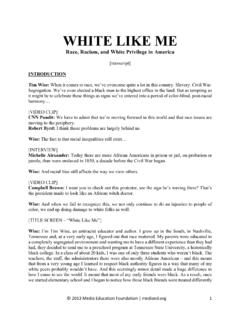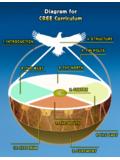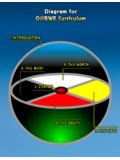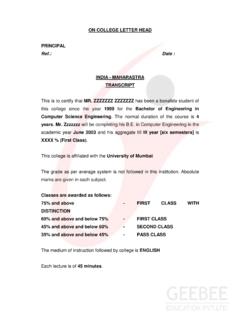Transcription of MEDIA EDUCATION FOUNDATION TRANSCRIPT
1 STUART HALLREPRESENTATION & THE MEDIAMEDIA EDUCATIONFOUNDATIONTRANSCRIPTC hallenging mediaSTUART HALLR epresentation & the MediaProduced & Directed by: Sut JhallyEdited by: Sanjay Talreja, Sut Jhally & Mary PatiernoFeaturing a lecture by Stuart Hall Professor, The Open UniversityIntroduced by Sut Jhally University of Massachusetts at Amherst MEDIA EDUCATION FOUNDATION MEF 19972 INTRODUCTION[Text on Screen]Do MEDIA images help us understand how the world works?What kinds of images of Black people are we presented with?[Movie: Hollywood Shuffle] I don t know why we s leaving massa s house. He s been good to us. He feed uson Saturday, clothes us on Sunday, and then beat us on Monday, or was itTuesday? I don t Jasper, I doesn t wants to go! I s a house nigger, Jasper!-- Jasper, don t you wants freedom?
2 We goin to the promised land, thepromised Promised Land? Cleveland?-- No No Jasper, the Promised Land!Oh, the Promised And cut.[Text on Screen] Who creates stereotypical representations of Black people?[Movie: Hollywood Shuffle] Hi. My name is Robert Taylor, and I m a Black Actor. I had to learn to play theseslave parts, and now you can, too, in Hollywood s first Black Acting School. Itteaches you everything: Learn Jive Talk (student 1) You motherfuckin jive turkey, (teacher) Alright, that s good. That s good, good work. All right, you try (student 2) You fucking mother s fucking (teacher) No, no, no, that s wrong, that s wrong. Watch me, man, just becool. Jive, turkey motherfucker!Good work, good work. That s only the beginning. You too can learn walkBlack -- (teacher) No, no, no, no.
3 No rhythm. , too, can be a Black street hood, but this class is for dark-skinned Blacksonly. Light-skinned or yellow Blacks don t make good crooks. It s Hollywood sfirst Black Acting School; it teaches you (tv ad voice) Classes are enrolling now. Learn to play TV pimps, moviemuggers, street punks. Courses include Jive Talk 101, Shuffling 200,Epic Slaves 400. Dial JHALLY: As we head toward the 21st century, the role of the mass MEDIA insociety is being hotly debated. The term, The Politics of the Image refers tothis contestation and struggle over what is represented in the MEDIA . Thisprogram examines this debate by focusing on the work of one of the world sleading experts on MEDIA Hall is Professor of Sociology at the Open University in England and, forthe last thirty years, has been at the forefront of work concerning the MEDIA srole in society.
4 Hall is very closely identified in MEDIA studies with an approachknown as cultural studies, and he starts with one of its central concepts:representation. The usual meaning of this term is connected with whether thedepiction of something is an accurate or distorted reflection. In contrast to this,Hall argues for a new view that gives the concept of representation a muchmore active and creative role in relation to the way people think about the worldand their place within it. This new view of representation is central to thinkingabout communication in much more complex ways. Hall shows that an imagecan have many different meanings and that there is no guarantee that imageswill work in the way we think they will when we create , sometimes Hall s concern with drawing attention to the complexity ofcommunication is seen as downplaying the idea that the MEDIA have real andstrong effects on the world.
5 Nothing could be further from the truth. Hallunderstands that communication is always linked with power and that thosegroups who wield power in a society influence what gets represented throughthe MEDIA . Hall wants to hold both these ideas: that messages work incomplex ways, and that they are always connected with the way that poweroperates in any society, together at the same time. He examines our everydayworld where knowledge and power way he does that is through what he calls interrogation of the image. Theidea of interrogation normally brings to mind asking hard questions of asuspect. But how do we interrogate an image? By examining it, asking the hardquestions about it rather than just accepting it at face value. Just as a goodinterrogator looks behind the suspect s story or alibi, so must we probe insideand behind the should we think this way about images?
6 Marshall McLuhan once said hewasn t sure who discovered water, but he was pretty sure it wasn t the fish. Inother words, when we are immersed in something, surrounded by it the waywe are by images from the MEDIA , we may come to accept them as just part ofthe real and natural world. We just swim through them, unthinkingly absorbingthem as fish in water. What cultural studies would like us to do is step out ofthe water in a sense and look at it, see how it shapes our existence, and evencritically examine the content of the follows is a talk that Stuart Hall gave at the University of Westminster inLondon. I hope your response mirrors my own when I first heard him lecture. Iwas an undergraduate student in England in the 1970s, and Stuart came tospeak at the university I was attending. Through his energy, his passion, hismodesty, he convinced me of the value of what he calls the intellectualvocation, the notion that ideas matter, that they are worth struggling over, thatthey have something to tell us about and can influence the world out there4beyond the academy.
7 In this way, he insists on the role that intellectual workcan play in helping to regain control of an image-dominated world that hasdrifted beyond the democratic reach of ordinary REPRESENTATION & THE CONTEMPORARYWORLDSTUART HALL: First let me say what the main theme of what I m going to saytoday is. I m going to talk about the notion of representation, which is a verycommon concept in cultural studies and in MEDIA studies kinds of work, but Iwanted to explore the idea a little bit. And I want to try and say something abouthow I understand representation working and why it s a more difficult and morecomplex subject than it appears to begin with. I m talking about largely visualrepresentation, or the examples I m going to try to cite are from visualrepresentation. But I think what I m going to say has a bearing on the practicesof representation in choose visual representation because it s a kind of clich to say that in themodern world our culture is saturated by the image in a variety of differentforms.
8 The image itself whether moving or still and whether transmitted by avariety of different MEDIA seems to be, or to have become, the prevalent signof late-modern culture. Late-modern culture is not only that culture which onefinds in the advanced, industrial, post-industrial societies of the western because of the global explosion in communication systems, it is also thesaturating medium, the saturating idiom, of communication worldwide. So Ithink to try and take the idea of representation to the image is an importantquestion. Cultural studies has paid a tremendous amount of attention in oneway or another to the centrality of representations and of the practice ofrepresentation. And MEDIA studies itself is, in an obvious sense, concerned inpart with the variety of different texts, in my instance, visual texts:representations which are transmitted by the MEDIA .
9 But I m going to standback from that a bit to begin with and try and look at the process ofrepresentation OLD VIEW Representation as Reflection/Distortionof RealitySTUART HALL: Now, the word has a kind of double meaning, even in itscommon-sense understanding. It does mean to present, to image, todepict to offer a depiction of something else. And the word representation orrepresentation does sort of carry with it the notion that something was therealready and, through the MEDIA , has been , this notion that somehow representation represents a meaningwhich is already there is a very common idea and, on the other hand, one of theideas that I m going to try to subvert. So I give you the common-sense meaningto try to take it back a little bit in what I m going to say. But then there s anotherunderstanding of the word representation, which also plays a role in what webring to this topic because we speak of political figures as representing us insome way.
10 We probably don t say that very often these days; you may not thingthey represent us very well, but they re sort of supposed to represent us, and inthat sense, they stand in for us. They are our representatives, and where wecan t be, they can be. So the notion of something which images and depicts,and that which stands in for something else, both of those ideas are kind ofbrought together in the notion of , what this idea that MEDIA practices, among other things, represent topics,represent types of people, represent events, represent situations; what we retalking about is the fact that in the notion of representations is the idea of givingmeaning. So the representation is the way in which meaning is somehowgiven to the things which are depicted through the images or whatever it is, onscreens or the words on a page which stand for what we re talking if you think that the meaning that it is giving is very different from or a kind ofdistortion of what it really means, then your work on representation would be inmeasuring that gap between what one might think of as the true meaning of anevent (or an object) and how it is presented in the MEDIA .
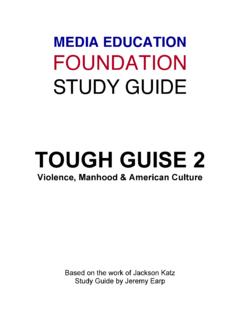
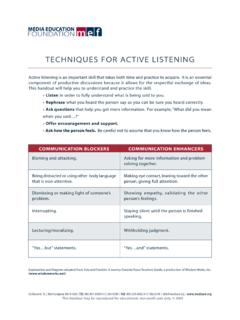
![Tough Guise 2 [Official Transcript] - Media Ed](/cache/preview/c/3/b/5/2/d/3/e/thumb-c3b52d3e6a3437c17d6d8ad6485bd936.jpg)
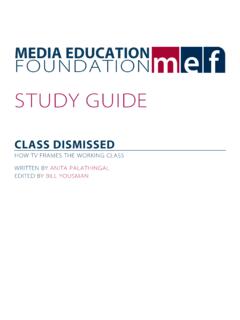

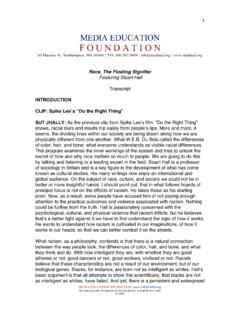
![Requiem For The American Dream [Transcript]](/cache/preview/a/b/8/4/f/8/1/2/thumb-ab84f812664524b6923d6df2929c06cf.jpg)
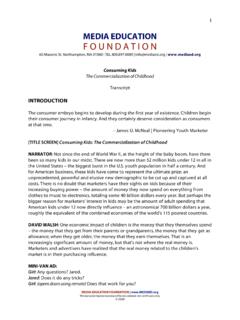
![Advertising at the Edge of the Apocalypse [Transcript]](/cache/preview/d/e/7/c/d/b/4/6/thumb-de7cdb46ab24a926068f936b79251872.jpg)
